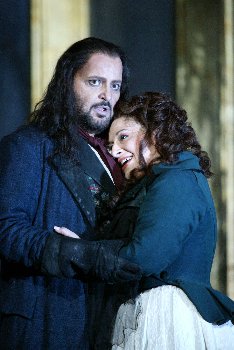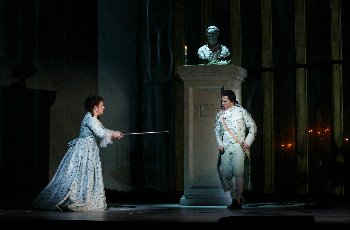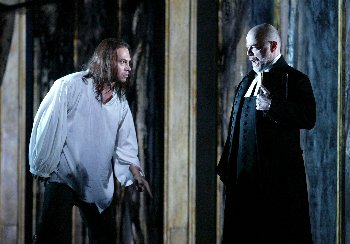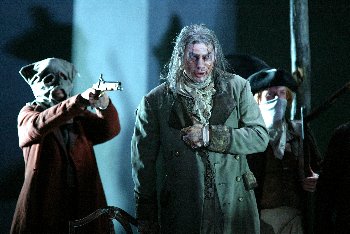|
I masnadieri - Royal Opera House Covent Garden London
|
| |
Royal Opera House Covent Garden London, October 11,
2002
I
masnadieri

Carlo (Franco Farina) and Amalia (Paula Delligatti) finally
found each
other again, but too late for an happy-end.
Photo: Clive
Barda
While
Rigoletto (first performed in 1851) belongs to the standard repertory of
almost each opera house throughout the world, the Royal Opera House
staged with Verdi's I masnadieri (Libretto: Andrea Maffai after
Schiller's Die Räuber) a very seldom played opera of the Italian
composer, which had been first performed ever at London in 1847. The
premiere in Her Majesty's Theatre (today hosting famous musicals like
The Phantom of the Opera) at July 22 in presence of Her Majesty Queen
Victoria had no remarkable success as the music historians stated. This
success should come with the Italian premieres at Rome and Florence in
1848. But, a permanent establishment in the repertory of the opera
houses was not given to the work, since operas like Rigoletto (1851), La
traviata and Il trovatore (1854) took over its place. Nevertheless, in
the second half of the 19th century it had performances of I masnadieri
all over the world as in Buenos Aires, New York, Vienna and Paris. The
fist performance in German language it had not before 1928 taking place
at Bremen (GER)

Amalia (Paula Delligatti) even uses the wword of
Francesco (Dmitri Hvorostovsky) to defend herself.
The
opera tells the story of the count's son Carlo (tenor), who believes to
be disowned due to a by his sly, younger brother Francesco (baritone)
forged letter of his not in a good health being father, the Count
Massimiliano von Moor (bass), and becomes the leader of a band of
robbers and murderers. His fiancée Amalia (soprano), who is at the same
time the niece of the count, waits in vain for his return. When the
count hears through a by his son
Francesco faked story from the supposed dead of Carlo in a battle,
he collapses. Francesco declares his father to be dead and throws him
after his awakening in a prisoner's tomb. By the servant Arminio (tenor),
who does not cover any longer Francesco's lies, Amalia hears the truth
that neither Carlo nor his father are dead. She resists the declarations
of love and the obtrusiveness of the new count Francesco, who wants to
take her as his wife, and she escapes from the castle. In the night of
thunder and storm she meets by accident Carlo, who also frees his father.
Finally she has to realize that Carlo has become a robber. Since she
does not want to leave him nevertheless, but Carlo wants to spare her a
life as outlaw, he kills her and is murdered afterwards by his own
people. His brother Francesco was hit by nightmares and begged the
priest Moser (bass) for absolution, which he is not granted by the
priest. Francesco is finally killed by the robbers as well.

Priest Moser (Eric Halfvarson) does not give the
requested absolution to Francesco (Dmitri Hvorostovsky).
The
London production, which has been shown at some festivals already in the
Verdi year 2001, had its premiere at London end of September. The
performance of October 11, 2002, has been the fifth at the Royal Opera
House Covent Garden. As the Rigoletto performances also the I masnadieri
- performances shined by its outstanding cast. Especially difficult to
sing is the role of Carlo, which starts with a lyrical aria, heightens
into the dramatic spheres and comes at the end back to the lyrical. The
American tenor Franco Farina succeeded in this change from the lyrical
into the dramatical and back into the lyrical field with in its whole
range certain, expressive, beautiful phrasing voice and his in all
registers pleasant timbre. Especially touching is his duet with this
father, who gives him the
blessing of a father without knowing that his own son is kneeling
in front of him. With an impressive, waarm voice in full bloom and with
dignity acts the German bass René Pape as Count von Moor. Without any
problems the soprano Paula Delligatti swings her beautiful sounding
soprrano into the heights, but also in the middle-range her voice is
convincing. Dark and a bit far behind, but very fitting for the role of
the sly Francesco, sounds the in good line guided baritone of Dmitri
Hvorostovsky. Credible is his madness at the end of the opera viewing
his near end. Powerful and impressive is the bass of Eric Halfvarson as
Pries Moser.

Count Massimiliano (Rene Pape) has to witness how
his son Carlo and his niece Amalia die.
he
experienced Verdi interpret Edward Downes in front of the orchestra of
the Royal Opera Houses acts as a convincing champion of the opera, who
manages to fill all the changes in the mood and atmosphere with life. As
in all Verdi pieces also in I masnadieri the choir takes an important
role and in the end the robbers are those to decide about life and death.
The
production of Elijah Moshinsky with the designs of Paul Brown and the
lightning of Howard Harrison stays fortunately in the time of the
libretto
in the beginning of the 18th century as well in the stage design
as in the costumes.
The revolving stage was used skillfully by the director. A nice
idea was to show Carlo, when Amalia was singing about him full of
longing, at the window
of the winter garden. Though with I masnadieri Verdi did not
proceed on his way to a psychologizing music drama, but the opera owns
wonderful melodies and offers the soloists great moments to present
their vocal gifts. From this view the opera is without doubt an
enrichment of every operatic repertory.
Birgit Popp
I masnadieri -
Verdi
ROH Premiere Sept.
28, 2002
Count Massimiliano -
Rene Pape
Carlo - Franco Farina
Francesco - Dimitri Hvorostovsky
Amalia - Paula Delligatti
Arminio - Edgaras Montvidas
Moser - Eric Halfvarson
Rolla - Grant Doyle
Conductor - Edward
Downes
Director - Elijah Moshinsky
Designs - Paul Brown
Lighting design - Howard Harrison
Orchestra and Choir of the ROH
Rigoletto at the ROH in October 2202
top |
|